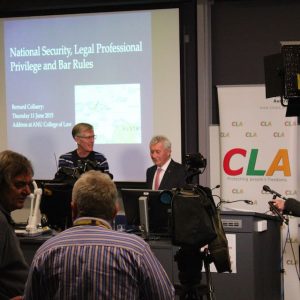A leading legal body in Australia is so deeply concerned about abuses of the Rule of Law in Australia that is compiling evidence of transgressions and planning a national conference.
ICJ to campaign for rule of law
The International Commission of Jurists is mounting a project Australia-wide to raise awareness of legislatures and bureaucracies abandoning commitments to the Rule of Law.
In the first stage, ICJ Victoria will compile an inventory throughout the nation of laws and administrative procedures that do not sit easily with traditional concepts of the Rule of Law.
“An individual piece of legislation or a specific administrative act might be explained on the basis of a particular exigency, (but) collectively these legislative and administrative acts are forming a worrying pattern in a country that is said to be committed to the Rule of Law,” project convenor, barrister and ICJ life member Louis Coutts said.
After compiling the inventory, ICJV will involve other Australian chapters of ICJ Australia and hold a national conference to create wider awareness.
The conference is likely to be held early in 2016.
Examples that have provoked ICJV concern include:
- Suspending the passport of the ASIS spy involved in Australian eavesdropping on the East Timor government by using listening devices to record the conversations of ET ministers and bureaucrats during the negotiations in relation to the Timor Sea oil rights. With his passport suspended, he can’t travel to The Hague to give evidence in the action brought by East Timor against Australia. In addition, the offices of his lawyer, Bernard Collaery, were raided and confidential client documents taken under the approval of the Australian Attorney General;
 Photo: Bernard Collaery speaks at ANU about the raid on his office.
Photo: Bernard Collaery speaks at ANU about the raid on his office.
- The elimination of the rights of people injured in car accidents to recover damages for pain and suffering and loss of enjoyment of life as a result of the negligence of other parties. This extends also partly to injured workers;
- Amendments to Customs and other legislation (Australian Border Force Act 2015) which prohibits people such as doctors at immigration detention centres from disclosing information in relation to the circumstances of individuals at those centres under pain of two years imprisonment;
- The ability of the Commissioner of Taxation to interpret the Act which he has the responsibility of administering and thereby giving guidelines as to conduct that is non-compliant;
- Recent bikie laws in Queensland that impose solitary confinement imprisonment of people charged with an assembly offence before conviction which is contrary to provisions of the International Covenant on Civil and Political Rights;
- Provisions of anti-terrorist legislation that suspend long-held assumptions about procedural fairness such as the right to a lawyer of your own choosing and the right to be present in court when evidence against the accused is given;
- Persistent refusal of the High Court to give weight to international treaties to which Australia is a party.
Help the project
There are many such examples in many different areas of the law, Mr Coutts said. “I am writing to you to see if you can assist in this project by supplying details of questionable issues in your particular area of expertise.”
For further information contact convenor Louis Coutts at couttslm@bigpond.com or on 0400 056 012.

